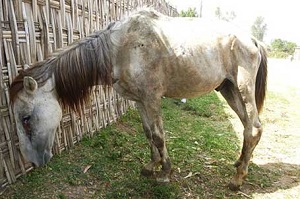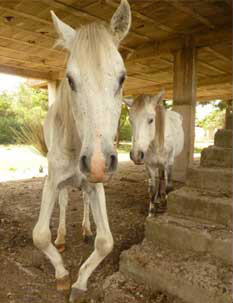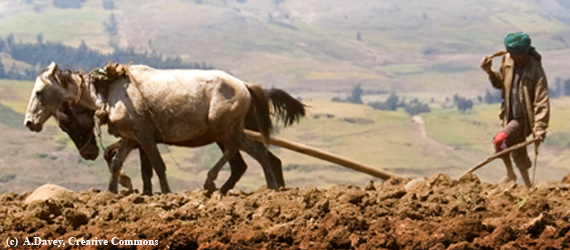Most of us have a good idea of what animal welfare means and why it’s important. But in developing nations, cultural and economic concerns can prevail when it comes to issues such as ending a working equine’s pain. It is not so long ago that horses, donkeys and mules across Europe, the US, Canada, Australia and New Zealand were primarily working animals. For many equines in other nations, that is still the case.
This thoughtful and sensitive post by Melissa Liszewski, Animal Welfare & Community Engagement Advisor of the Brooke, an international animal welfare organisation, gives an insight into a difficult subject, and describes a compelling legal solution developed in Ethiopia. It was first published on the Brooke’s blog in January 2015.
“I myself have seen animals in the countries we work in and I don’t even know how they have managed to remain standing, let alone pull heavy loads day in and day out …”
There are so many challenging aspects of the work we do here at the Brooke, but there is nothing like coming across an animal suffering from protracted or incurable disease, injury or debility to really put our animal-loving hearts and minds to the test.

We work hard to relieve hard working horses, donkeys and mules from their suffering. But what happens when despite our best efforts, and the best efforts of local stakeholders, an animal’s illness, injury or overall condition means they have a poor outlook for a fit and pain free working life?
I have often pictured a lush green oasis where all those hard working horses, donkeys and mules can retire and live out the rest of their days pain free with all the care they need, full bellies and lots of space to just do whatever they please all day as thanks for their many hard years of service.
“The hard reality is that such a beautiful retirement for both the animals we serve and the communities they serve is just a picture in our heads.”
The truth is that there are an estimated 112 million working equines in this world and although we work tirelessly to help as many of them as possible in a meaningful way, we are still only able to reach about 2 million of them.
Much like the owners of the animals we serve, we do not have endless resources so we have to do the best we can for the animals with what we have.
At the Brooke, we accept that euthanasia is an effective way to alleviate suffering and prevent future suffering. We have a Euthanasia Policy to ensure that when the practice is carried out by our staff or partners it is done with the utmost care and consideration of the animal’s experience.
(c) the Brooke. No reproduction of partial or entire text without permission of the Brooke. Sharing the link back to this page is fine. Please contact jane@thehorsesback.com for more information. Thank you!
When euthanasia is the only option
When suffering cannot be alleviated by any other means, euthanasia is the only humane solution. However, there are many complexities surrounding the practice of euthanasia that must be considered:
- Can euthanasia be done humanely?
The answer is yes, but in some countries we work in certain methods of euthanasia are not available, cannot be imported and/or are not legal. Our teams then have the difficult task of weighing out potential suffering at the point of death with potential suffering if the animal was not euthanized, in order to always aim for the best welfare outcome for the individual animal.
- Are there legal implications?

In Halaba, Ethiopia our local team worked hard to get by-laws in place that would allow abandoned animals to be euthanized without the legal risk of someone coming forward after the fact and claiming their animal was taken without consent.
Nationwide in Pakistan, our team is working tirelessly to overcome the challenge of carcass disposal due not only to environmental and practical concerns, but also the fact that illegal donkey meat is a rising problem that could be wrongfully attributed back to our organisation if a euthanized animal weren’t disposed of properly, allowing someone to eat it and get sick.
These are considerations we must keep at the forefront of our euthanasia decisions as the effects could be catastrophic to local initiatives benefiting whole communities of animals if our reputation became damaged or trust lost.
- Is it culturally acceptable?
There are places where we work that euthanasia is not seen as an acceptable practice due to religious or cultural reasons, or because owners feel they are killing an animal that provided them with a service, and prefer a natural death for the animal. Our staff work sensitively with individual owners in such cases, trying to balance respect for cultural practice or religious beliefs with the welfare needs of the animal concerned.
- Is it ethical for us to intervene?
It is crucial that euthanasia is not carried out without the owner’s permission, meaning our teams must always obtain informed consent. Our teams in the field strive to ensure owners do not feel coerced into the practice, but come to the decision based on the facts they have been given by medical professionals, and their own desire to do what is best for their animal.
Sometimes, euthanasia is refused because an owner has no other source of income to provide for their family. In some communities we work, for example in India, the Brooke has helped set up group savings funds and equine insurance schemes, which can help owners make the best decision for their animal without economics being a barrier.
When euthanasia simply isn’t possible
Despite our best efforts, for all of these reasons and more, euthanasia is simply not always an option, and we must be prepared to do whatever we can in such cases to work with owners to ensure the animal is well cared for, relieved of their pain and rested until the very end. This is a painful reality at times for our staff in the field.
I myself have seen animals in the countries we work in and I don’t even know how they have managed to remain standing, let alone pull heavy loads day in and day out; deformed and damaged limbs, debilitating disease, old, weak and worn down animals at the end of their working life. I have also seen and talked to owners with their own heart-breaking stories of survival, not knowing what the future holds for their family and how they will get by.

Most often, the owners of these animals are not intentionally cruel, and although it may be easy to judge from far away, we must put ourselves in their shoes, as they work hard every day to put food on the table for their family and provide a better life for their children than they had for themselves.
Making assumptions or judging others will not erase or improve the suffering of working horses, donkeys and mules but what may help is a good dose of compassion for both the animals and the humans who care for and depend on them.
Yes, I have seen debilitated working animals abandoned to fend for themselves against hungry hyenas in Ethiopia, but just a few kilometres away in the same country I have also seen poor owners steadfastly caring for animals that cannot work or contribute anything economically to their family, bringing them into their own homes at night to protect them from those very same hyenas.
There are many reasons and situations where euthanasia may be considered and it is always an emotional decision, both for our own staff and the local people we work with, but it is our duty to do what we can to provide comfort and relief to suffering animals who work so very hard for the people depending on them.
The success of the by-laws in Halaba, Ethiopia, along with training of local service providers to ensure humane euthanasia is possible for suffering animals, mixed with engaging local communities to improve preventive husbandry practices and ensure euthanasia is an acceptable option when required, is proof of what can be done to help hard working animals.
This is our mission and this is what we stand for at the Brooke – I hope that you will stand behind us.
The Brooke is an international animal welfare organisation dedicated to improving the lives of working horses, donkeys and mules in some of the world’s poorest communities. The charity provides treatment, training and programmes around animal health and wellbeing, operating across Africa, Asia and Latin America.
You can follow the Brooke on Facebook, while more information on the organisation’s work is available on the website: www.thebrooke.org.
